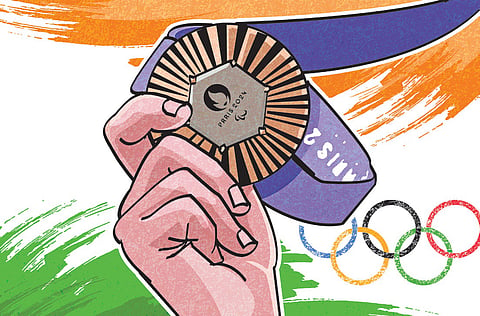India’s Olympic performance: A mirror to its sporting mediocrity
Another Olympics has come to a close, and true to form, India returns with almost empty hands: one silver medal, five bronze, and no golds. For a nation of over 1.4 billion, this is nothing short of shameful. With a meager total of around 40 Olympic medals in history—mostly hockey until the 1980s—our celebrations are inflated around near misses like Milkha Singh’s and PT Usha’s 50 or 60 years later. Our sporting glories are nothing but monuments to our mediocrity.
Why this dismal performance? Is it because Indians don’t value sports, prioritising academics instead? The collective wisdom of Indian parents seems to dictate that time spent on the field or a sports broadcast is time wasted, urging their children to invest every moment in educational pursuits. India is chock-full of coaching centres and tuition classes in even the smallest towns, all preparing kids for competitive exams. We trumpet the virtues of academic success as the pathway to prosperity, yet the question arises—are we even good at academics? Our education system mainly produces obedient employees rather than innovators or disruptors.
It’s worth noting the last scientific Nobel laureate from India was CV Raman. The rest with Indian names achieved their victories abroad and conducted their research outside Indian universities. Talk about providing a strong foundation. Which of the Indian corporates have gone to global brands like Apple or Toyota? What was the last Indian innovation in Indian soil that contributed to the progress of humanity? So why should sports be any different?
Like any other field, in sports too, we remain mediocre. In our quest for scapegoats, many point fingers at cricket, claiming it stifles other sports. Yet cricket is one of the few sports where we perform reasonably well, making it absurd to blame it for the lackluster outcomes of our athletes in other fields. It is not for lack of funding or facilities. Over the years, funding for various sports has been substantial.
Of course, nepotism runs rampant, with politicians often filling sports association positions with family and friends—a lovely little arrangement that exists even in cricket. The current BCCI president, is not known for setting the cricket pitch on fire with either his bat or bowl. He secured his role thanks to his political lineage. Yet, despite this, cricket has still led us to victory in the World Cup. Success does not hinge on who is at the helm but rather on the athletes’ immense talent, effort and the hunger to win.
Following the recent Olympics, where Indian shuttlers fell short, former badminton star Prakash Padukone remarked that funding isn’t the issue anymore; it’s time for the players to step up and secure medals for the country.
Objectively speaking, most Indian sports—except for cricket and chess—have become a drain on our resources, providing little in return. India shells out around Rs 3,000 crore annually to promote sports, with programmes like Khelo India getting the lion’s share. Of course, there are allegations of unfair funding allocation. For example, states like Gujarat and Uttar Pradesh—known for many things but not notable sports prowess—received nearly 40 per cent of the budget. The political motivations are obvious. At least, the politicians are efficient that way. Our sportspeople are not going to get any medals, so why not gather some votes and show some favouritism? Unlike most of us, they are smarter and know their options better.
For a nation boasting one-fifth of the world’s population and resources, our inability to compete with countries that resemble tier-II Indian cities in GDP and population is sobering. It’s time to accept this reality and move on. We must halt the use of taxpayer money for these sports excursions and picnics disguised as competitions.
Cricket’s rise in popularity and sponsorship came from the groundbreaking efforts of Kapil Dev’s championship team, not because it got a lot of government funds. Similarly, chess flourished thanks to the individual brilliance of self-made champion Vishwanathan Anand and not through lavish state investment.
Why then should we continue to fund sports in which we don’t even come in the top 100 teams with taxpayer money? Advocates argue that success in sports boosts a country’s soft power. But repeated failures dent that very power. The arts, literature, and cinema also project our cultural identity, yet we do not allocate resources to support artists, filmmakers, or writers at the same scale. Icons like AR Rahman, SS Rajamouli, and Arundhati Roy achieved international fame without government funding.
So why the singular focus on sports, which have yielded little success in the last 75 years, while simultaneously criticising the only sport where we shine, cricket? As with any human endeavour, success must come first—much like how Kapil’s Devils did in 1983. Only then will corporate sponsorship, ad revenue, and fame follow.
It is high time we reallocate taxpayer money to more pressing issues, such as improving our hunger index and nutrition, rather than spending it on sports. All it is doing now is to allow politicians to secure positions in sports authorities for friends and family. They embark on foreign expeditions along with a bunch of mediocre athletes, all the while delivering nothing but a few medals and even more shame to a nation of 1.4 billion. Soft power, indeed.
Anand Neelakantan
Author of Asura, Ajaya series, Vanara and Bahubali trilogy
mail@asura.co.in

